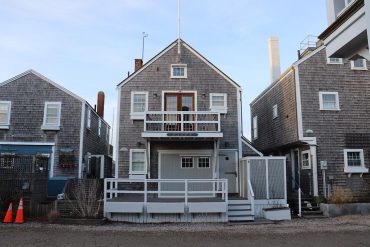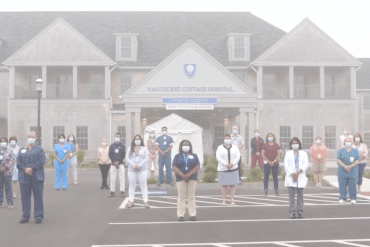The $17.5 million proposal to upgrade the Nantucket Public Schools athletic facilities, including two new synthetic turf fields, has become mired in concerns over PFAS, the group of so-called “forever chemicals” linked to some cancers and other health conditions.
The presence of PFAS in synthetic turf fields has prompted some islanders to raise concerns about exposing student athletes to such chemicals and the potential for contamination of the island’s sole source aquifer. Those fears have been relayed by both the current and former deputy fire chiefs at the Nantucket Fire Department, as well as others in the community, who have brought them to the attention of the Nantucket School Committee.
In the latest chapter of the debate, the school’s paid consultant on the project, toxicologist Laura Green, has come under fire for allegedly downplaying the risks of PFAS while citing her credentials with the federal Environmental Protection Agency. A report published Wednesday in E&E News has put a spotlight on Green’s work on Nantucket, Martha’s Vineyard, and in other communities where she has attempted to allay concerns about PFAS in synthetic turf fields.
Green, the owner of the private firm Green Toxicology LLC, was hired by the Nantucket Public Schools as a consultant to assist the athletic facilities project team on the issues of synthetic fields and public health, with a specific focus on answering questions about PFAS. Her contract with the school system, signed on Sept. 9, stipulates she be paid up to $20,000 at a rate of $295 per hour.
During a Nantucket School Committee meeting in September, shortly after she was hired, Green told the committee members and others in attendance that “there’s no reliable evidence that PFAS harms human health” and that even factory workers in plants where the chemicals were being manufactured were not harmed by their exposure.
The E&E News report quotes an anonymous EPA spokesperson repudiating those statements, as well as an email in which an EPA ethics official requests Green clarify that her comments regarding PFAS reflect her own personal views, and not those of the agency.
The fallout from the report continued yesterday, as Green resigned from her position as a special government employee with the EPA, blasting the agency for “malicious disrespect” and for commenting to the E&E News reporters “without either copying me or contacting me or doing any research at all.” Green also offered to submit her resignation to the Nantucket Public Schools, but no decision has yet been made on her role with the island school system. Nantucket Public Schools Director of Facilities and Grounds Diane O’Neil said Green’s contract and continued services for the school are now “under review.”
In an interview with the Current on Thursday, Green criticized E&E’s reporting, and continued to emphasize that synthetic turf fields are safe, and do not pose risks to athletes or the island’s aquifer.
“I think it was a fairly mean-spirited propaganda piece,” Green said. She cited critics on Martha’s Vineyard, where the regional planning commission recently voted in favor of a synthetic fields project that Green also consulted on, as the sources of those casting doubt on her work.
“I get that there are monied interests on Martha’s Vineyard that are not happy the Martha’s Vineyard Commission voted to approve the project, and monied interests in Oak Bluffs trying to stall the process,” she said. “It’s a place that has surprised me. And it’s saddened me and surprised me that there’s so much venom. There’s a lot of distrust and anger on Martha’s Vineyard and that’s spilling over to Nantucket. I don’t really understand it.”
The town of Oak Bluffs on Martha’s Vineyard is now considering banning artificial turf fields containing PFAS, and Nantucket’s sister island is also reacting to the news regarding Green and the EPA.
Nantucket School Committee chair Dr. Tim Lepore said Thursday that he was aware of the report published by E&E News, but declined to discuss the specific allegations it contains regarding Green.
“I’m undecided right now, but I am concerned about PFAS and I’m not going to get into ad hominem attacks,” Lepore said. “What she (Green) does, who she is, how she represents herself, she is someone who has a reputation, and I’m more interested in the information. I want to know is PFAS going to be a concern?”
The Nantucket PFAS Action Group, which was co-founded by island resident Ayesha Khan, has continued to criticize Green and raise concerns about synthetic turf fields. On Thursday, Khan issued the following statement to the Current on behalf of the PFAS Action Group:
“Testing has shown every artificial turf field has PFAS. We have concerns with PFAS leaching into our sole source aquifer and hope that we can take a precautionary approach to minimize environmental and public health. There are plenty of case studies that show that grass, the safer alternative, can meet our usage needs. We hope that NPS will do the right thing and cut ties with an industry-funded scientist who minimized the risks of PFAS to a community that was just looking for honest answers.”
O’Neil, the Director of Facilities and Grounds at the public schools, was asked about the situation involving Green and where the project stands now, and she emphasized the need for the project and why it is on the table in the first place.
“We have a 72 percent participation rate in athletics,” O’Neil said. “We can no longer keep up with the maintenance to offer safe playing fields for our students. When the committee had the participation numbers and realized the amount of work, money, fertilizer, grubbing materials and water we put on those two fields just to barely maintain them, they realized there was no other choice than to move towards a synthetic solution for those two fields.”
On the island, PFAS have already been discovered in water wells around Nantucket Memorial Airport, at a property off Hawthorne Lane, and notably in Nantucket Fire Department’s turnout gear.
Used to manufacture stain- and water-resistant products, PFAS is a class of chemical compounds, some of which are suspected to increase the risk of kidney and testicular cancers, as well as other health conditions.
The type of PFAS used to manufacture synthetic turf fields is not currently being targeted by the EPA to be regulated, and Green emphasized it is unlike the PFAS compounds used in airport firefighting foam and those associated with dangerous industrial plant discharges.
“The polymer is a fluoropolymer,” Green said. “It’s stable, inert, and it’s used in things like medical sutures and desalination plants. The FDA approves these materials to stitch up peoples’ wounds. The FDA approves these materials to serve in artificial joints. You think they don’t demand proof of safety and efficacy? If these fluoropolymers were not stable and biocompatible and inert, would the FDA allow them to be used in surgery?”
But Dr. Lepore pushed back on that argument, stating sutures containing a certain kind of PFAS never see the light of day, whereas a turf field containing PFAS has the potential to breakdown in sunlight and the elements.
“The comparison to sutures being placed inside someone – they’re not exposed to the sun, and I’m concerned about breakdown,” Lepore said. “I’m not sold either way, I have concerns and I’d like to see them addressed. Are we affecting our kids? Are we affecting our water supply? I want to hear both sides.”
The school’s athletic facilities project, designed by Richard Webb, of the architecture firm SMRT, encompass not only the new fields, but also improvements to the grandstands, parking, traffic flow, and lighting. While a funding request was being tentatively considered for the 2022 Annual Town Meeting, the timeline for a vote on the project is now unclear.






